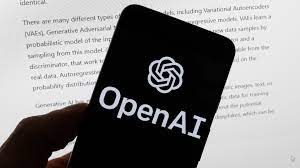FTC Investigates OpenAI's ChatGPT: What It Means For AI Regulation

Table of Contents
The FTC's Concerns Regarding ChatGPT and Data Privacy
The FTC's investigation into OpenAI centers primarily on potential violations of consumer protection laws. Their focus is on ChatGPT's data handling practices and whether they adhere to established regulations. Specific concerns include:
-
Unfair or deceptive practices related to data handling: The FTC is scrutinizing how ChatGPT collects, uses, and protects user data. This includes examining whether OpenAI has been transparent about its data collection methods and whether users have been given meaningful control over their data. The use of personal data for training the model without explicit consent is a key area of concern.
-
Violation of COPPA (Children's Online Privacy Protection Act): If children are using ChatGPT, the FTC will investigate whether OpenAI complies with COPPA, which sets strict rules for collecting, using, and disclosing children's personal information online.
-
Insufficient safeguards to protect sensitive personal information: The FTC is assessing whether OpenAI has implemented adequate security measures to protect user data from unauthorized access, breaches, or misuse. This includes evaluating the robustness of their data encryption, access controls, and incident response protocols.
-
Potential for discriminatory outcomes due to biased training data: AI models like ChatGPT are trained on vast datasets, and if these datasets contain biases, the model may perpetuate and even amplify those biases in its outputs. The FTC will likely investigate whether ChatGPT exhibits such biases and whether OpenAI has taken steps to mitigate them. This is crucial for ensuring fair and equitable outcomes for all users.
The Broader Implications for AI Development and Innovation
The FTC investigation into OpenAI's ChatGPT carries significant implications for the broader AI development landscape. The increased regulatory scrutiny could create a "chilling effect," potentially slowing down innovation:
-
Increased costs associated with compliance and data security: Companies will likely need to invest more heavily in data security measures, legal counsel, and compliance processes to meet stricter regulations. This could particularly impact smaller startups.
-
Slower development timelines due to more stringent regulatory approvals: Before releasing new AI models, companies might face more extensive review and approval processes, leading to delays in bringing products to market.
-
Potential for shifting investment towards less risky AI projects: Investors may become more cautious about funding AI projects perceived as high-risk from a regulatory perspective, potentially hindering innovation in more ambitious areas.
-
The need for a balanced approach to regulation that encourages innovation while mitigating risks: The challenge lies in finding a regulatory framework that fosters responsible AI development while avoiding excessive restrictions that stifle progress. This requires a nuanced approach involving input from researchers, developers, and policymakers.
The Future of AI Regulation in Light of the OpenAI Investigation
The OpenAI/ChatGPT investigation is setting a precedent for AI regulation globally. It underscores the need for clear guidelines and standards:
-
The development of comprehensive AI ethics frameworks: This includes defining acceptable uses of AI, establishing mechanisms for accountability, and addressing issues of bias and fairness.
-
The role of international cooperation in AI regulation: Given the global reach of AI technologies, international collaboration is crucial to developing consistent and effective regulations.
-
The establishment of independent AI oversight bodies: Dedicated regulatory bodies can provide expertise and oversight to ensure that AI systems are developed and used responsibly.
-
The importance of public engagement and transparency in the regulatory process: Open and transparent discussions involving the public, researchers, and policymakers are crucial for building trust and ensuring that regulations reflect societal values.
What Companies Can Learn from the OpenAI/ChatGPT Investigation
The FTC's investigation offers valuable lessons for AI companies aiming to mitigate future regulatory risks:
-
Implementing robust data security protocols: This includes employing strong encryption, access controls, and regular security audits to protect user data from unauthorized access.
-
Conducting thorough bias audits of AI models: Proactively identifying and mitigating biases in training data is crucial to ensure fairness and equity in AI outputs.
-
Developing clear data privacy policies and obtaining informed consent: Companies must be transparent about their data collection practices and obtain explicit consent from users before collecting and using their data.
-
Investing in AI ethics training for employees: Equipping employees with the knowledge and skills to develop and deploy AI responsibly is essential.
Conclusion: Navigating the Future of AI with Responsible Regulation
The FTC's investigation into OpenAI's ChatGPT highlights the crucial need for responsible AI governance. This case is shaping the future of AI regulation, prompting a much-needed conversation about data privacy, algorithmic bias, and the ethical implications of powerful AI technologies. A collaborative effort involving policymakers, researchers, and industry stakeholders is essential to establishing a regulatory framework that balances innovation with accountability. Stay informed about developments in the FTC's ChatGPT investigation and the evolving landscape of AI regulation and its implications for AI and OpenAI. Engage in discussions about responsible AI development to help shape the future of this transformative technology. Understanding the "FTC's ChatGPT investigation" and its implications is crucial for navigating the complex world of AI regulation and ensuring a future where AI benefits society as a whole.

Featured Posts
-
 Five Indian Soldiers Killed In Renewed India Pakistan Border Violence
May 12, 2025
Five Indian Soldiers Killed In Renewed India Pakistan Border Violence
May 12, 2025 -
 Chantal Ladesou Spectacles Films Et Pieces De Theatre
May 12, 2025
Chantal Ladesou Spectacles Films Et Pieces De Theatre
May 12, 2025 -
 L Incroyable Duo De Scenes De Menages Gerard Hernandez Et Chantal Ladesou
May 12, 2025
L Incroyable Duo De Scenes De Menages Gerard Hernandez Et Chantal Ladesou
May 12, 2025 -
 Is Selena Gomez Dating Benny Blanco Addressing The Cheating Speculation
May 12, 2025
Is Selena Gomez Dating Benny Blanco Addressing The Cheating Speculation
May 12, 2025 -
 The Real Story Behind Henry Cavills Beard In Mission Impossible Fallout
May 12, 2025
The Real Story Behind Henry Cavills Beard In Mission Impossible Fallout
May 12, 2025
